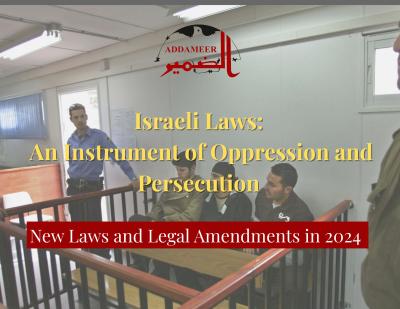
Following the events of 7 October 2023 and the ensuing acts of genocide perpetrated by Israeli occupation forces in the Gaza Strip, thousands of Palestinians from Gaza and the West Bank, including occupied East Jerusalem, have been detained. These individuals are currently being held in detention centers operated by the Israeli military or the Israel Prison Service (IPS), subjected to different legal frameworks. The variety of Israeli detention facilities has not masked the alarming realities faced by Palestinian detainees, as revealed by testimonies from both released individuals and those still incarcerated, gathered by lawyers and human rights organizations. These accounts indicate that, irrespective of the legal frameworks governing them, Palestinian prisoners endure consistently inhumane conditions marked by ill-treatment, including torture and sexual violence, along with various other violations.
Concurrently, Palestinian prisoners and their families have been systematically targeted by laws and bills enacted by the Israeli Knesset, some of which have been under discussion since October 7. In 2024, the Knesset persisted in enacting discriminatory laws aimed at Palestinian prisoners, violating their fundamental rights and those of their families, which has led to the deportation of families of prisoners in occupied East Jerusalem. The occupying authorities have further sought to undermine the well-being of prisoners by extending the state of emergency across all detention facilities, conducting trial sessions via video conferencing, denying access to courts, keeping prisoners without proper bedding, and enforcing overcrowding, among other oppressive measures.
This year, the Israeli Knesset has concentrated on enacting or proposing a range of laws that significantly impact the economic conditions of Palestinians, particularly affecting prisoners and their families. A key piece of legislation under consideration is a bill that would permit individuals harmed by what Israel classifies as "terrorism"—specifically actions labeled as Palestinian "resistance"—to seek compensation from organizations that support these acts, including the Palestinian National Authority. Additionally, the Knesset has deliberated on a bill aimed at imposing sanctions on financial institutions located in the West Bank and Gaza Strip that engage with banks and other entities within the occupying state, if it is demonstrated that these institutions transfer funds from the Palestinian Authority to individuals deemed "terrorists" by Israeli standards, including released prisoners and the families of martyrs. The proposed law would also enforce sanctions and restrictions on Israeli financial institutions or those operating within the occupying state if they conduct business with these foreign entities without proper disclosure.1
Two other proposed draft laws have emerged, enabling the Israeli government to withhold funds from Palestinian tax revenues to pay for the medical care of Palestinian prisoners held in Israeli detention.2 This initiative represents a blatant avoidance of the occupying power's obligations regarding prisoner treatment, as outlined in international agreements and the guidelines of the Israel Prison Service. The law received final approval on 11 October 2024, mandating that funds be deducted from the Palestinian tax revenues held by the Israeli government to finance Israeli defense attorneys appointed by the court from the so-called "Government Defense Authority" to represent Palestinian prisoners involved in the October 7 attacks.3 The intention behind this law is to undermine the legitimacy of the arrests made by the Israeli occupation forces, especially since Palestinian lawyers and organizations have refused to defend these prisoners, citing the illegality of their detention. Nevertheless, the Israeli Public Defense Office has declined to represent any Palestinian prisoner from the Gaza Strip arrested after October 7. It is important to recognize that this is merely a part of a broader set of laws and proposals that the occupying state is pursuing to further burden the families of prisoners through various means.
Regarding the Palestinians apprehended from the Gaza Strip, several were taken into custody under the 2002 Incarceration of Unlawful Combatants Law4, a law that significantly undermines the protections outlined by international humanitarian and human rights laws designed to safeguard detainees, particularly vulnerable individuals such as children. Notably, the regulations in effect in 2024 failed to differentiate between adult and child detainees, lacking any protective measures for minors.
It is widely recognized that individuals deprived of their liberty during armed conflicts face heightened vulnerability, with a significant increase in the likelihood of ill-treatment and inhumane conditions. This risk is particularly acute when detention occurs under unlawful circumstances, as seen in the practices of the Israeli occupying state, which has inflicted considerable harm on detainees and caused severe psychological trauma to both them and their families. To alleviate this suffering, international humanitarian law establishes essential standards that must be adhered to for detention to be considered lawful. These regulations, along with international human rights law, outline the legitimate grounds for detaining individuals, mandate procedures to ensure the legality of detention from the outset and throughout its duration, and impose stringent requirements regarding the treatment of detainees and their living conditions. Furthermore, they highlight the importance of maintaining communication between detainees and the outside world, facilitating external oversight of their treatment.